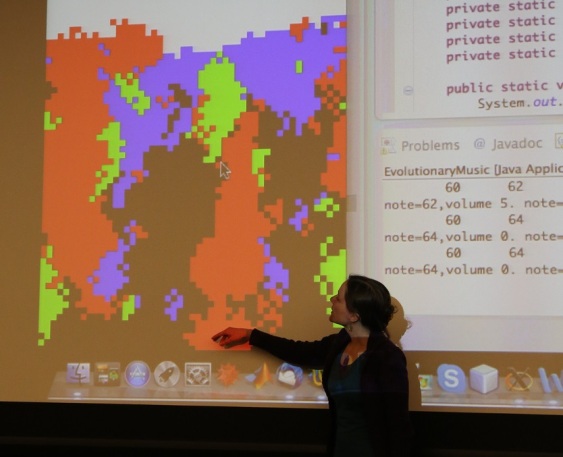We held the first Science Hack Day in Boston this last weekend, October 19-20th in B-100 and B-103 of Northwest Labs, on the Harvard campus. It was a blast!
After hearing exciting lightning talks and project pitches on Saturday morning, groups formed around a huge variety of different interests, including transcranial stimulation, cellular automata, the human gut microbiome, and the language of science communication.
The next 24 hours was filled with discussions, brainstorming, prototyping, coffee, and couch naps. A few inspirational die-hards hacked on their project all night long!
On Sunday afternoon, groups demonstrated their work to judges, who named their favorites.
Tied for Grand Prize: Wikipedia Women in STEM
Women are underrepresented in Wikipedia, both as editors and within articles. In an impressive solo effort, Jessica McKellar built Wikipedia Women in STEM, “a proof of concept project that programmatically identifies Wikipedia articles on women in STEM that lack important basic features, making it easy for casual contributors to take on bite-sized projects.”
Tied for Grand Prize: A “Laser” phonograph
The Harvard Poetry Archive needs a way to screen through lots of unlabeled lacquer discs that are too fragile to be played mechanically. Many are likely to be uninteresting, so it would be too expensive and time-consuming to digitize them all with state-of-the-art technology. However, some contain things like Robert Frost reading his own work. To find these, this group developed image processing tools to convert grooves in a record to sound files so that anyone with a commercial photo scanner can digitize old records. At the time of the presentations, the audience was able able to hear a second-long snippet of (clearly musical) sound they had extracted from one groove, but they didn’t stop there. Stay tuned for more exciting updates from this group!
In addition the two grand prize winners, judges also named two honorable mentions.
.Honorable mention: Fads and Impact Factor
What’s considered hot in science? This team found that the answer to that question changes rapidly from year to year. They developed a tool to look at the relative impact factor of PubMed keywords over time. Using this, they showed that many fields rise and fall out of glamour journals with alarming speed.
The topic of Impact Factor was also touched on during Christina Szalinski’s talk the previous day.
Honorable mention: Open Source Collaboration Software: File Previews
This group worked to extend the file preview capabilities of the Center for Open Science’s Open Science Framework. It’s a collaboration tool that allows scientists to archive and share data in a variety of formats, and several file types were added this weekend!
Congratulations to all the hackers! Watching the feed of the presentations below, you’ll be able to see why the judges had a difficult time deciding on winners. You can also read about all the awesome hacks here.
In addition to the fantastic groups that presented hacks, we have many people and organizations to thank!
- The generous sponsors who made this possible: FAS Center for Systems Biology, NSF Physics of Living Systems, American Society for Cell Biology, swissnex Boston, Wyss Institute, HMS Postdoc Office, and Boloco.
- Our fantastic speakers: Dan Novy, Buz Barstow, Michael Baym, Melissa Lewis, Sikander Hayat, Christina Szalinski, and Jose Gomez-Marquez.
- Our judges: Pamela Silver, Professor at Harvard Medical School, Henry Holtzman, Vice President at Samsung, Jessica Rosenkrantz, Creative Director of Nervous System, and Jesse Louis-Rosenberg, Chief Science Officer of Nervous System).
- My co-organizer Willow Brugh, for all her guidance and help with every aspect of the planning process, and for her amazing facilitation skills during the event,
- Our patient and generous host Ethan Garner, who secured and coordinated our beautiful venue,
- Jenna Eun for her help with organizing publicity and sponsorship, and manning the registration desk together with Lyre Calliope
- My lab mates: Cameron Myhrvold for his photography skills, and Tyler J. Ford and Steph Hays for baking morale-sustaining brownies and an truly epic cake,
- Ariel Waldman for providing helpful advice!
And most of all, thanks to everyone who came to brainstorm, hack, and observe!
We are already looking forward to the second Science Hack Day in Boston, which we’re planning for next year! To be notified with registration opens, please sign up here. If you’re interested in helping with organizing or sponsorship, please email me at jessica.polka@gmail.com.






